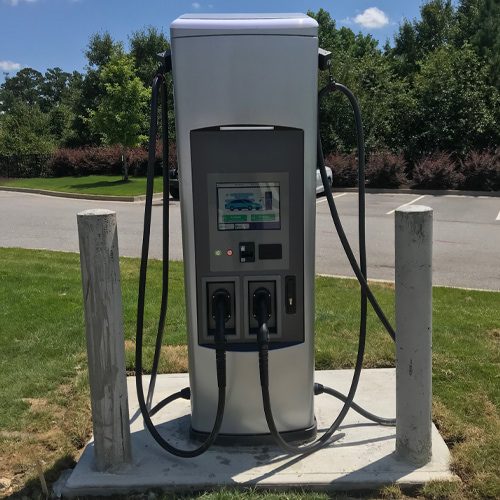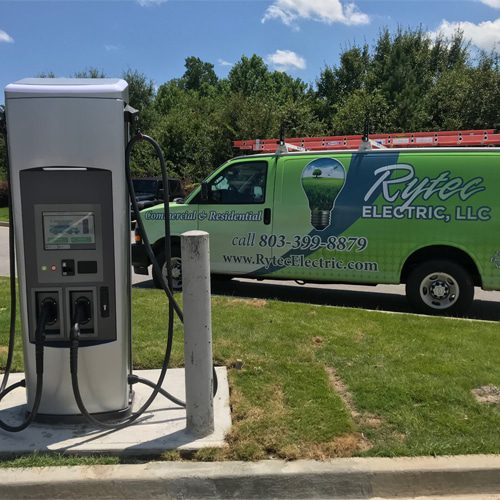Do I need an electric car charger installed?
These days, more and more people are opting for electric vehicles. This is a great decision for many reasons, including lowering or eliminating gas fill-up costs, helping the environment with lower toxic emissions, and in some cases even tax credits. But, there’s one question that a lot of people don’t know the answer to: do I need an electric car charger installed at my home? We’re going to answer this question and give you the exact steps for how to make it happen. Let’s go!
Can I Install an EV Charger at Home?
The main thing to know is that electric car chargers are not the same as the outlets you plug your phone and laptop into at home. EV chargers are a completely different type and require special care with installation and use.
Side note: if you aren’t a rocket scientist, don’t worry! We know electronics and engineering terminology can be confusing for many people, so we’re going to break it all down to make it super easy to understand.
Firstly, power is counted in something called volts. You can think of voltage a little like one of those AA batteries that you put into your TV remote control. When power comes into your outlets at home, it’s like a ton of batteries all at once.
So, when it comes to electric vehicles, they need a special amount of power. In fact, they need a dedicated power supply of 240 volts of electricity.
If you look at an outlet in your home or office, right now, you’ll almost definitely see one on top and one on bottom. These standard outlets at home are usually 120 volts each, even though the total power supplied is a full 240 volts. That’s because the top outlet gets 120 volts, and the bottom outlet also gets 120 volts, for a total of 240 volts. That’s really all you need to know in terms of the science stuff. Now, for the answer to the main question: can you install an EV charger at home? The answer is yes.
But (and this is a BIG BUT!), because of the voltage required, it is absolutely essential for an EV-certified and licensed electrician to install your EV charging station. You should not try to do this yourself. This isn’t because we don’t think you’re smart or capable. It’s because it isn’t safe for anyone to do this that isn’t trained and certified to do it. With all of that in mind, let’s answer a few more important questions when it comes to how to charge your EV and how to install an EV charging station.
Can I Plug My Electric Car into a Regular 120 Volt Outlet?
This question has a very surprising answer… Yes! Yes, you can charge your electric car with a regular 120 volt outlet. But, there are some things you should know about this before you do.
Every major electric vehicle made today will have home outlet charging capability. This will allow you to plug straight into a standard 120 volt (or 110 volt in some cases) outlet at your home.
The main disadvantage of using a 120 volt outlet at home to charge your EV is how long it takes. Home outlets are called “Level 1 chargers”. At a Level 1, it will get you about 3 to 5 miles of driving for every single hour of charging your electric vehicle.
You can multiply the number of hours by the mileage to get your driving estimate. For example: If you charge your car for 10 hours overnight, you will get about 30 to 50 miles of driving usage from it.
If you work from home, or your commute is very short, you might be fine with simply charging on your 110 volt or 120 volt outlets at home. If you have a longer commute or need to regularly drive long distances, then you will want to install a dedicated 240 volt EV charger at home.
What is the difference between a level 1, 2, 3 etc. electric charger?
We mentioned a Level 1 charger above. There are actually a bunch of charging levels ranging from Level 1 to Level 2 to Level 3, and even some chargers that don’t fit these categories.
Level 1
Level 1 chargers are charging stations with 120 volts. As we talked about earlier, these will give you about 3-5 miles per charging hour.
Level 2
Level 2 charging stations are 240 volts. These are what you will find with public chargers, such as in parking garages, but you can also have level 2 chargers installed at home! With these, you will get somewhere in the range of 15-40 miles per charging hour. That’s quite a range, but it will depend on the specific EV you have. Check out this chart to see how much your electric car (or a similar EV) will get.
Level 3
Level 3 chargers need more than your usual home power supply, but the extra equipment will get you 120-150 miles per charging hour. Note: Level 3 charging stations are not intended for home installation or home use.
Rapid chargers
Rapid chargers are usually quick public chargers that can refill your entire EV battery in under 30 minutes. Again, these are not usually found at homes.
The really nice thing about all these is that all electric vehicles can use any charging type or charging level of EV power source. The only real difference between all of them is how fast it charges and how long you will be able to drive on an hour of charging time.
Can I leave my EV plugged in overnight?
This is a very common question. Thankfully, the answer is easy and simple: Yes! Yes, you can leave your EV plugged in overnight and charge up the battery.
This is because electric cars have a built-in monitor to stop charging when it reaches its full capacity. In other words, you don’t need to worry that you’ll overcharge or run up your energy bill overnight.

How much of an effect will a home EV charger have on my power bill?
Which brings us to our last question. How much does it cost to charge an EV at home?
For this, we’ll turn to Kelly Blue Book, one of the most reliable experts in the car industry. They spoke with John Voelcker, a career journalist in the automotive industry and an electric vehicle speciality analyst.
John says:
“A conservative rule of thumb is that an electric car gets 3 to 4 miles per kWh. […] So divide the total miles you drive each month by 3, to get the kWh you would use monthly. Multiply that number by your cost per kWh. The dollar amount you get will most likely be lower than what you pay each month to buy gasoline.”
Kelly Blue Book goes on to explain what this means for most EV drivers at home:
“Again, to keep things digestible, let’s use a simple formula. If you put 1,000 miles on your vehicle each month, for example, and pay 10 cents for each kilowatt-hour of electricity, this pegs your at-home EV recharging bill at $25 to $33 dollars per month (based on the calculation of 3-4 driving miles equaling one kilowatt-hour). Even if you double your electric rate to 20 cents per/kWh, your EV recharging cost will be $50 to $66 dollars.”
In other words, it wouldn’t cost you very much at all! Plus, you are almost certainly saving money by using electricity instead of filling up with gas at the tank.
Conclusion
Ultimately, EV charging at home is a very simple process. But, to install a Level 2 Charging Station at home you will need to hire someone with the right experience and certification to get it done right.
At Rytec Electric in South Carolina, we pride ourselves on doing things the right way every time. In fact, you can probably just ask the guy or gal down the street with an electric car. We probably did their house, too!
We treat every customer like we would a close friend. Every phone call is important to us. Every home is treated with care.
If you want a little help planning for your home EV charging station installation, give us a call at Rytec today at 803-399-8879. We can’t wait to help you!

